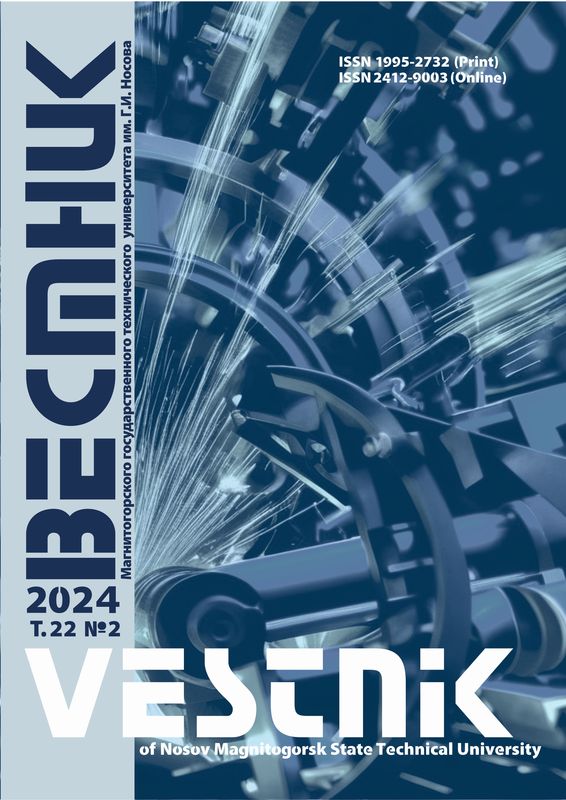DOI: 10.18503/1995-2732-2024-22-2-145-152
Abstract
Problem Statement (Relevance). In a large metallurgical enterprise, as a rule, the product range consists of hundreds and sometimes thousands of items, both by steel grade and by a size range, aimed at a huge number of customers. At the same time, the technological process and the equipment used are sufficiently unified. However, there is often a situation when a customer places an order for a new type of metal products with strictly standardized quality indicators, and the technical and technological capabilities of its manufacturing are not always obvious at first glance. In these conditions, it is necessary and possible to use adaptive principles of quality management. Objectives. Research is aimed at studying the possibility of principles of technological adaptation of quality indicators in relation to hierarchically complex systems based on the choice of a precedent. Methods Applied: the analysis of existing hierarchically complex technological systems; a decomposition of technological systems based on the construction of metrics; basic provisions of qualimetry. Originality. A concept has been developed to manage quality indicators based on their technological adaptation to constantly changing external influences. Result. An algorithm has been developed for technological adaptation of quality indicators of metal products based on a precedent in the technological system. Practical Relevance. Using the example of designing a technology for the production of strips for stamping coins, the authors show the possibilities to apply adaptive principles of metal products quality management in multiple-option technological systems.
Keywords
adaptation, quality indicators, metal products, precedent
For citation
Golubchik E.M., Polyakova M.A. Development of Adaptive Principles of Metal Products Quality Management. Vestnik Magnitogorskogo Gosudarstvennogo Tekhnicheskogo Universiteta im. G.I. Nosova [Vestnik of Nosov Magnitogorsk State Technical University]. 2024, vol. 22, no. 2, pp. 145-152. https://doi.org/10.18503/1995-2732-2024-22-2-145-152
1. Golubchik E.M. Adaptive management of the quality of steel products. Vestnik Magnitogorskogo gosudarstvennogo tekhnicheskogo universiteta im. G.I. Nosova [Vestnik of Nosov Magnitogorsk State Technical University]. 2014;1(45):63-69. (In Russ.)
2. Golubchik E.M., Korchunov A.G., Pivovarova K.G., Lysenin A.V. Application of adaptation mechanisms for improving the quality of downstream products. Vestnik Voronezhskogo gosudarstvennogo tekhnicheskogo universiteta [Vestnik of Voronezh State Technical University]. 2011;(5):131-134. (In Russ.)
3. Park H.S., Tran N.-H. An autonomous manufacturing system for adapting to disturbances. The International Journal of Advanced Manufacturing Technology. 2011;56(9-12):1159-1165.
4. Park H.S., Tran N.-H. A cognitive agent based manufacturing system adapting to disturbances. International Journal of Control, Automation and Systems. 2012;10(4):806-816.
5. Sokol M.B. Adaptation to difficult designs: Facilitating use of new technology. Journal of Business and Psychology. 1994;8(3):277-296.
6. Kim N., Pae J.H. Utilization of new technologies: organizational adaptation to business environments. Journal of the Academy of Marketing Science. 2007;35(2):259-269.
7. Žapčević S., Butala P. Adaptive process control based on a self-learning mechanism in autonomous manufacturing systems. The International Journal of Advanced Manufacturing Technology. 2013;66(9-12):1725-1743.
8. Akwei C., Zhang L. Integrating risk and performance management in quality management systems for the development of complex bespoke systems (CBSs). Production Planning & Control. 2018;29(15):1275-1289.
9. Ohrimenko O.I., Vilisova M.L., Rokotyanskaya V.V., Bidova B.B., Popovskaya A.S. Analysis and synthesis of complex technological systems. Journal of Mechanics of Continua and Mathematical Sciences. 2019;14(6):322-328.
10. Ivanov V.P., Zawadzkii V.K., Kablova E.B., Klenovaya L.G. Technology of quality and reliability of complex technical systems characteristics stage-by-stage improvement on examples of rocket-space technology objects. Advances in Systems Science and Applications. 2019;19(2):1-7.
11. Rastrigin L.A., Mafzharov N.E. Vvedenie v identifikatsiyu obektov upravleniya [Introduction to identification of control objects]. Moscow: Energiya, 1977, 214 p. (In Russ.)
12. Rastrigin L.A. Adaptation of complex systems. Izvestiya AN Latviyskoy SSR [News of the Academy of Sciences of the Latvian Soviet Socialist Republic]. 1978;(5(370)):87-97. (In Russ.)
13. Golubchik E., Polyakova M., Gulin A. Adaptive approach to quality management in combined methods of materials processing. Applied Mechanics and Materials. 2014;656:497-506.
14. Golubchik E.M., Polyakova M.A., Chikishev D.N. Modern approaches to product quality adaptive control. International Journal for Quality Research. 2024;18(1):199-208.
15. Golubchik E.M., Polyakova M.A. Features of steel products quality management in multi-object technological systems. Kachestvo. Innovatsii. Obrazovanie [Quality. Innovation. Education]. 2023;(4(186)):3-11. (In Russ.)












